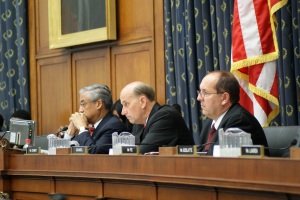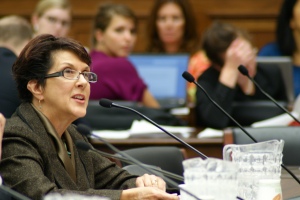Child sex trafficking is happening in every community, city and state in America. Yes, even your city. Unfortunately, this crime is too often under-reported and under-identified – effectively silencing victims and empowering buyers to continue the cycle of exploitation. Training and awareness are vital in identifying victims of trafficking. Response, however, leans heavily on the strength (or weakness) of the laws used to protect victims and prosecute traffickers and buyers.
Tomorrow, on National Human Trafficking Awareness Day, we are launching the Protected Innocence Initiative. Under this initiative, we will release fifty-one individual Report Cards in Spring/Summer 2011 to measure the level of protection afforded by state laws regarding sex trafficking of children. The Report Cards are based on the Protected Innocence Legislative Framework, an analysis of state laws performed by the American Center for Law & Justice and Shared Hope International.
The Protected Innocence Legislative Framework outlines six areas of law critical to protecting children and responding to domestic minor sex trafficking.
- Criminalization of domestic minor sex trafficking
- Criminal provisions for demand (buyers)
- Criminal provisions for traffickers (pimps)
- Criminal provisions for facilitators (hotels, transports, websites, etc.)
- Protective provisions for the child victims
- Criminal justice tools for investigation and prosecutions
The Report Card is premised on the belief that the true measure of a state’s standing is how well it protects its children and provides them with access to justice. By exposing the legislative gaps within each state that fail to provide the cornerstone of strong law to victim advocates, prosecutors and law enforcement, we hope to spark innovative action to increase protection for the victims and punishment for the criminals who exploit them.
Does your state allow children’s bodies to be converted to cash and innocence sold by the hour? Find out when we release the Protected Innocence Report Card for your state. Click here to let your Governor know that the quality of your laws mean the difference between safety and danger for children in your state.
Read more about the Protected Innocence Initiative online at Change.org.
 “Subcommittee will now come to order, and I am pleased to welcome you [to]…today’s hearing before the Subcommittee on Crime, Terrorism, and Homeland Security. The committee is hearing Domestic Minor Sex Trafficking and specifically,
“Subcommittee will now come to order, and I am pleased to welcome you [to]…today’s hearing before the Subcommittee on Crime, Terrorism, and Homeland Security. The committee is hearing Domestic Minor Sex Trafficking and specifically, 






